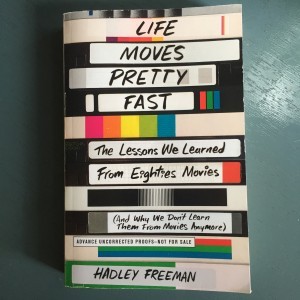Turn Down the Music and Read: Life Moves Pretty Fast
 I’m going to take a break from my usual monthly music book review to detour into movies, but when you understand that this is a book about ‘80s movies, you’ll no doubt agree that in that decade, music and movies were so intertwined that they’re basically the same thing anyway. To prove the point, quick, name that ‘80s movie:
I’m going to take a break from my usual monthly music book review to detour into movies, but when you understand that this is a book about ‘80s movies, you’ll no doubt agree that in that decade, music and movies were so intertwined that they’re basically the same thing anyway. To prove the point, quick, name that ‘80s movie:
Or that one:
Or that one. (This is kind of a trick question.)
I think you’re picking up what I’m laying down here, and I didn’t even have to resort to this:
My bookstore owner friend Kathleen at Oakland’s Great Good Place for Books pressed an advance copy of Life Moves Pretty Fast: The Lessons We Learned From Eighties Movies (And Why We Don’t Learn Them Anymore) by Hadley Freeman into my hot little hand a few weeks back and said, “Here, read this and tell me if we should carry it.”
I was not expecting much, to be honest. Of course I loved Dirty Dancing and Ferris Bueller and The Breakfast Club when they came out, but I have gotten a little leery about revisiting the movies of my high school years after a few Family Movie Nights at which I trumpeted, “this was the BEST movie when I was in high school!” only to find myself apologizing to the girls at the end for making them sit through something that had not aged well at all. Hadley will hate me for this, because for her it is the movie against which all others are judged, but Ghostbusters was the WORST.
But by the time I got to the last page of Life Moves Pretty Fast, I was pumping my arm like Judd Nelson walking away from The Breakfast Club, about how my generation’s teenage movies packed a wallop on issues like feminism, class warfare, a woman’s right to choose, and, as one chapter title puts it: “Romcoms Don’t Have To Make You Feel Like You’re Having a Lobotomy.” Peppered throughout are lists like Top Five British Bad Guys and Top Ten Weirdest Songs on an ‘80s Movie Soundtrack. Here’s one of those: “Peace in Our Life” by Frank Stallone, described by Freeman thusly: “Sylvester Stallone’s brother singing about peace in a movie in which his brother bombs the world. God bless you, Stallone family.”
I was also fascinated by her thoughts about why those kinds of messages and role models are missing from the current film landscape – skip this paragraph if you have managed to keep up with the movie industry in the past ten years, but I sure haven’t. So I’d never thought about the connection between the huge amount of money generated for film studios by overseas markets, and the need to create movies that don’t rely on nuanced characters or culturally-specific dialog to appeal to a non-English speaking audience.
In other words: in 2016, movies that get widespread distribution are superhero films with a lot of explosions. Not those about a girl named Andie talking with her dad about the rich kid she has a crush on, and whether she should fight for him, followed by a heartbreaking hallway scene in which she has to stand up for herself to said rich kid. I’m not too JAZZED about the 2016 varietal, in comparison.
The only real downside of this book is that you’re going to spend the next two weekends binge-streaming 80s movies with your kids and demanding that they acknowledge that Eddie Murphy was ripped off when it comes to his contribution to getting more black actors in film, for instance, or that Baby Boom was really one of the few movies in which a woman is shown having both a baby and a career without losing herself.
(But go ahead and skip Ghostbusters. I’ll take the heat.)










 Related StoriesTurn Down the Music and Read: The Jesus and Mary Chain – Barbed Wire KissesMom2.0 and Podcasting PotentialLadies First
Related StoriesTurn Down the Music and Read: The Jesus and Mary Chain – Barbed Wire KissesMom2.0 and Podcasting PotentialLadies First



